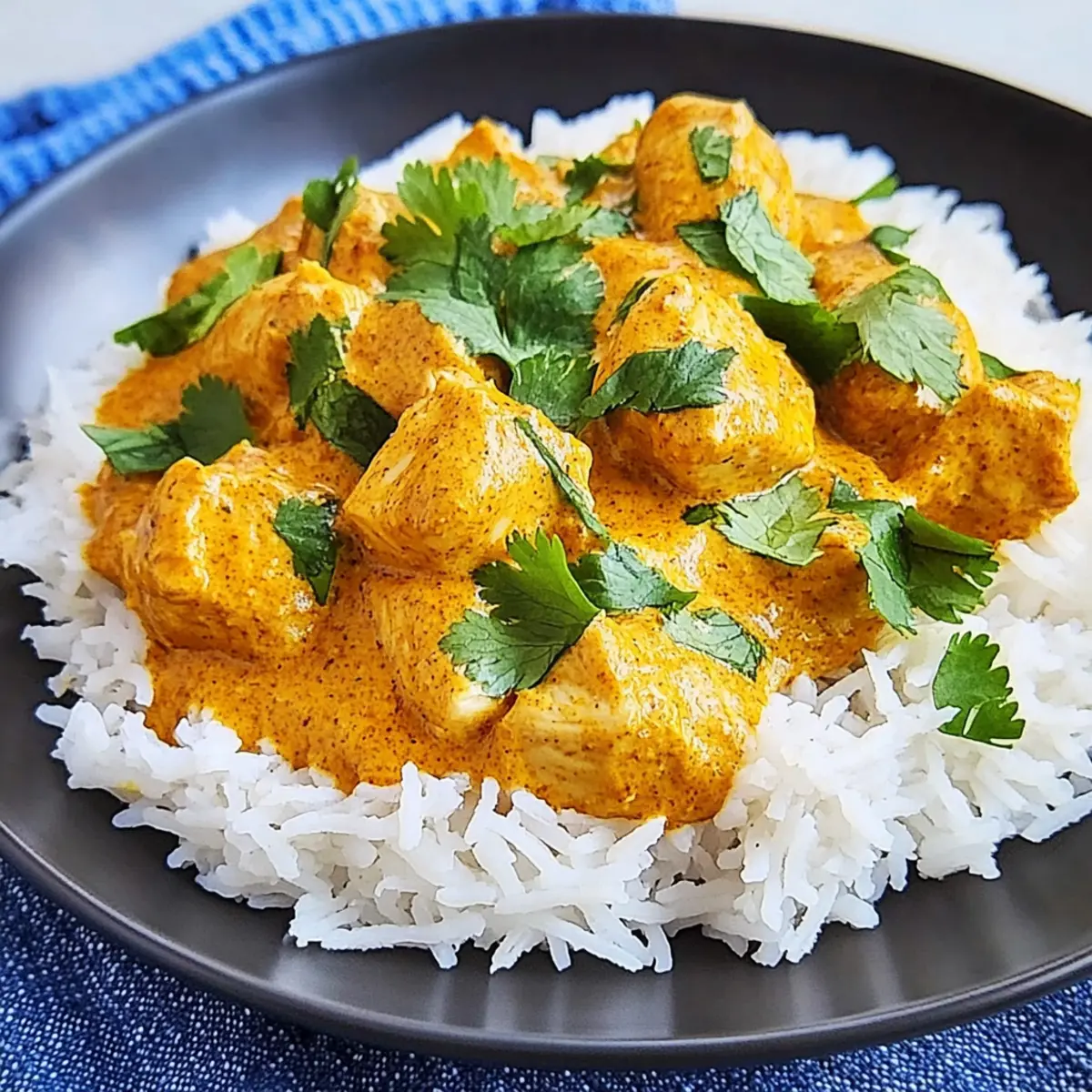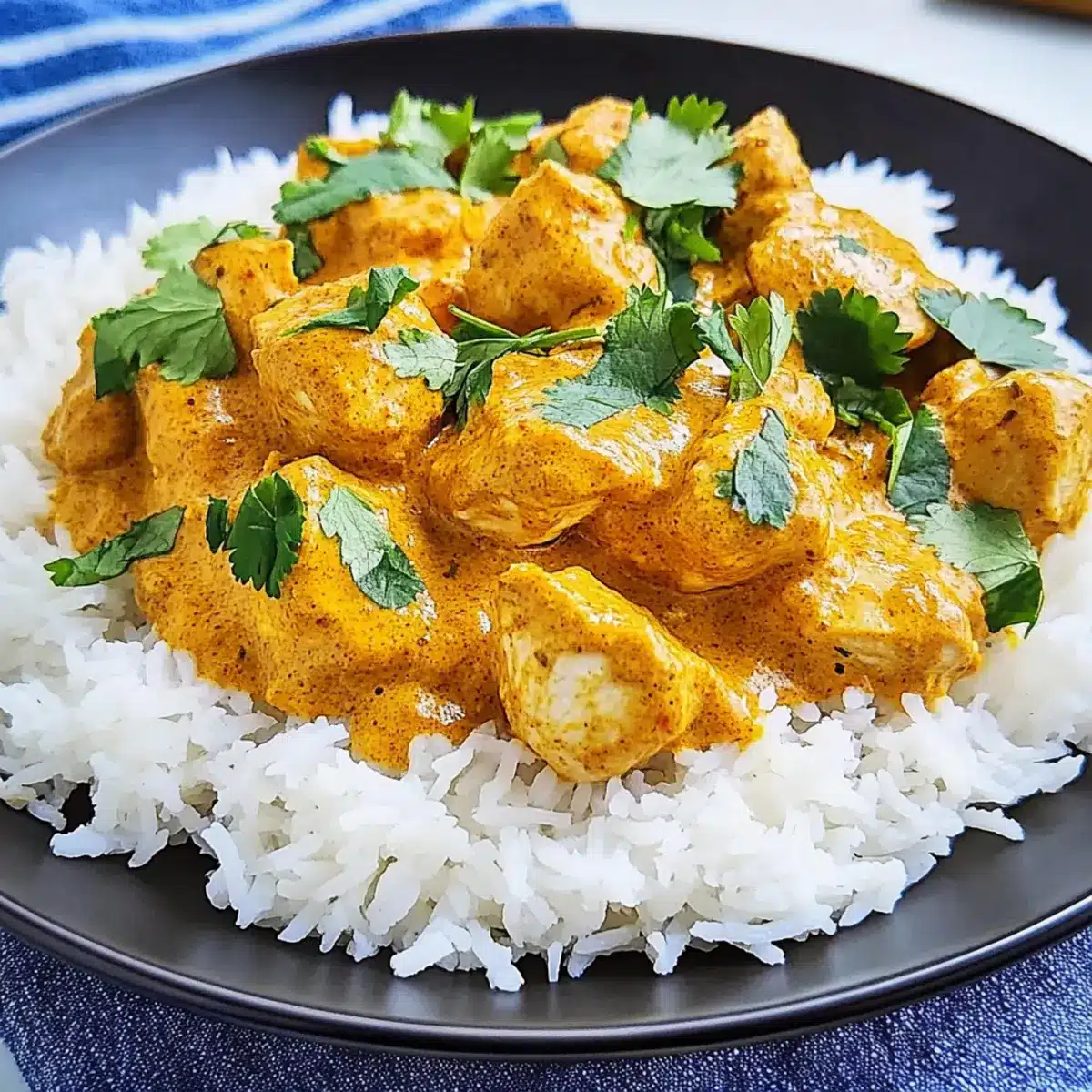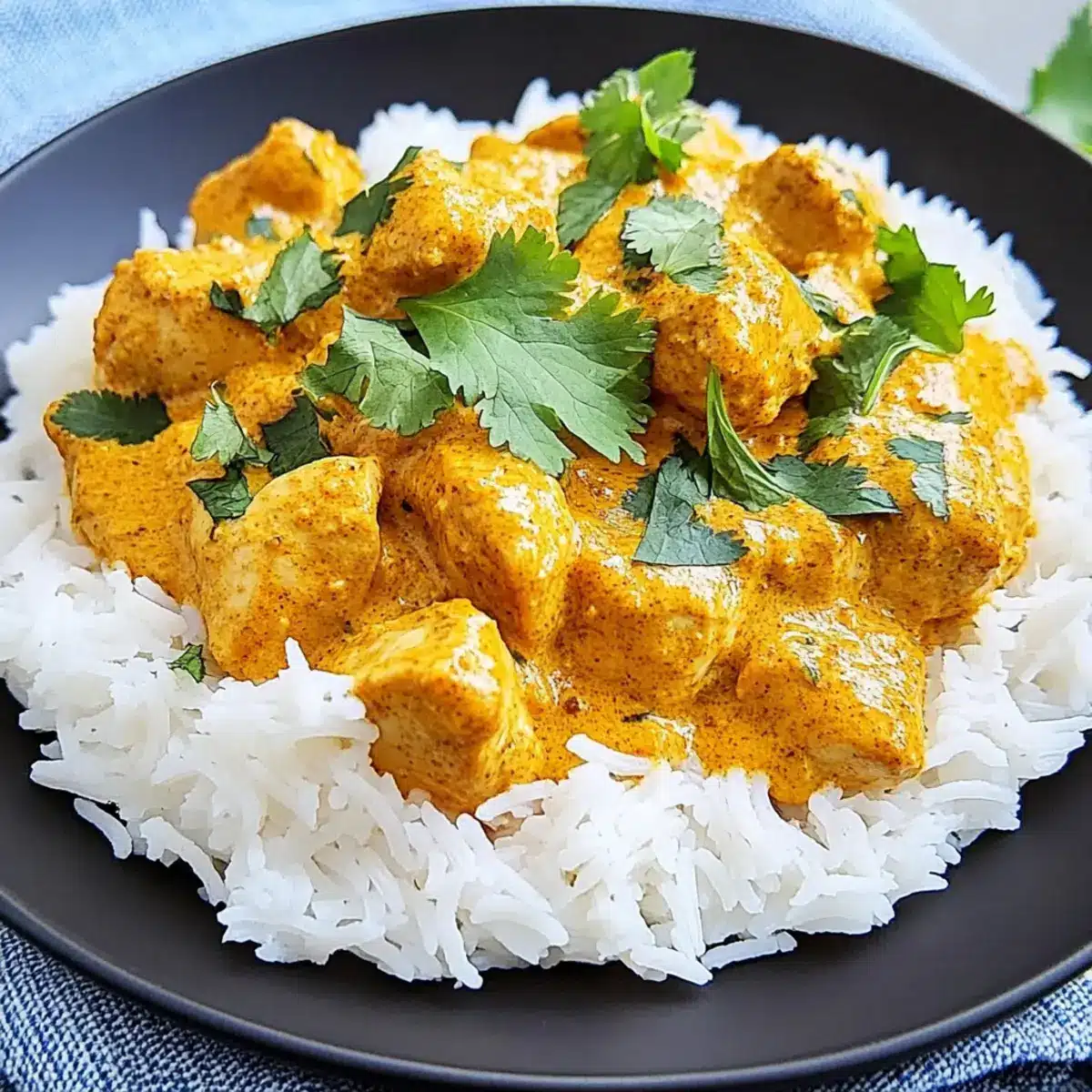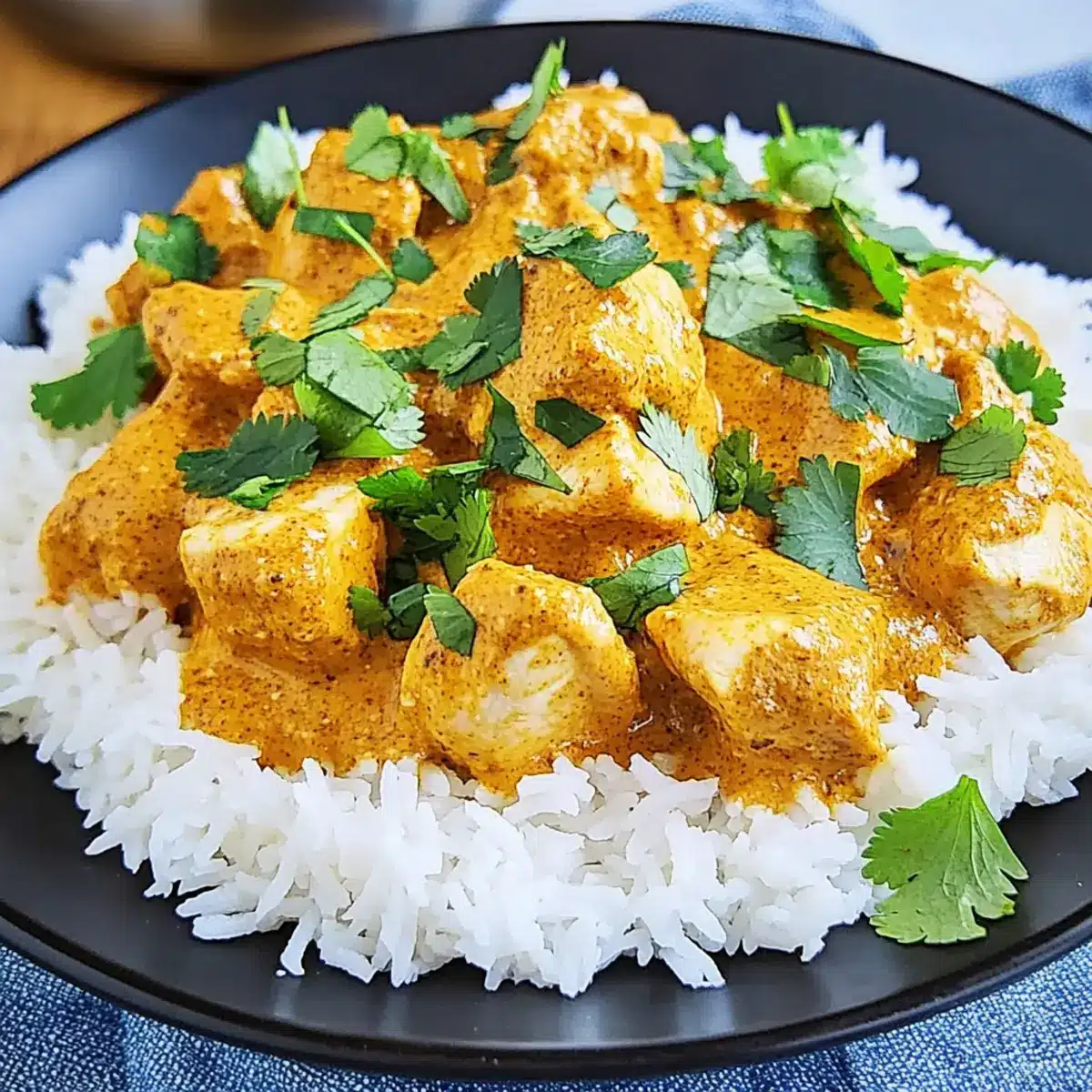As the aroma of spiced ginger and creamy coconut wafts through my kitchen, I know I’ve stumbled upon a weeknight miracle: Coconut Curry Chicken. This dish seamlessly combines tender chicken and a delightful coconut sauce, making it not just easy to whip up after a long day, but also a gluten-free treat packed with flavor. The best part? It’s ready in about 30 minutes, transforming those “what’s for dinner?” dilemmas into a delicious triumph with a restaurant-quality finish. Topped with fresh herbs and served over fluffy rice, every bite feels like a warm hug. Curious what makes this recipe so incredibly satisfying? Let’s dive into the details!

Why is Coconut Curry Chicken a Must-Try?
Easy to Prepare: This recipe transforms a busy weeknight into a delicious dining experience in just 30 minutes! Perfect for those who want homemade comfort without the fuss of complicated cooking.
Flavor Explosion: With its creamy coconut sauce and aromatic spices, this dish delivers a mouthwatering taste that rivals your favorite restaurant meals.
Versatile Ingredients: You can easily swap out chicken for chickpeas or even add vibrant veggies like bell peppers and spinach to customize it to your liking.
Gluten-Free Goodness: Made with naturally gluten-free ingredients, this Coconut Curry Chicken is a dish everyone can enjoy!
Crowd-Pleasing Appeal: Whether it’s just family or friends gathered for dinner, this recipe is sure to satisfy even the pickiest eaters. Serve it alongside warm naan or fragrant basmati rice for a complete meal that will leave everyone asking for seconds!
Coconut Curry Chicken Ingredients
For the Coconut Curry
• Vegetable Oil – Adds moisture and helps cook the aromatics; can substitute with canola oil.
• Butter – Enhances flavor and richness; vegan butter or ghee can be used as an alternative.
• Medium Red Onion, chopped – Provides a sweet base flavor; yellow onion works well too.
• Large Shallots, minced – Adds a mild, sweet onion flavor; use extra red onion if shallots are unavailable.
• Kosher Salt – Enhances overall flavor; substitute with table salt in equal amounts.
• Cloves Garlic, finely chopped – Introduces depth and aroma; fresh is best, but garlic powder can work too.
• Finely Chopped Ginger – Offers spiciness and warmth; fresh ginger is recommended over ground.
• Curry Powder – The primary spice blend that contributes warm flavor; garam masala can be an alternative.
• Tomato Paste – Adds richness and depth; fresh tomatoes or crushed tomatoes are acceptable substitutes.
• (13-oz.) Can Coconut Milk – Provides creaminess and a subtly sweet flavor; light coconut milk reduces fat.
• Water – Adjusts sauce consistency; chicken or vegetable broth can enhance flavor.
• Boneless, Skinless Chicken Breast, cut into 1″ pieces – The main protein source; swap with thighs or tofu for vegetarian options.
• Juice of ½ Lime – Brightens the dish; you can use lemon juice as an alternative.
For Serving
• Lime Wedges – Adds fresh acidity upon serving.
• Mint Leaves, torn – Introduces freshness and flavor contrast; substitute with cilantro if preferred.
• Cilantro Leaves, torn – Enhances flavor with a fresh, herbaceous note; parsley can be used instead.
• Cooked Rice – Acts as a base to soak up the curry; consider quinoa or cauliflower rice for a low-carb option.
This Coconut Curry Chicken ingredients list offers everything you need for a delightful and satisfying meal that everyone will love!
Step‑by‑Step Instructions for Coconut Curry Chicken
Step 1: Sauté the Aromatics
Heat 2 tablespoons of vegetable oil and 1 tablespoon of butter in a large skillet over medium heat. Once the butter is melted and bubbly, add the chopped medium red onion and minced shallots. Sauté for about 5-7 minutes, stirring occasionally, until the onions are tender and translucent, creating a fragrant base for your Coconut Curry Chicken.
Step 2: Add Spices and Garlic
Stir in 4 cloves of finely chopped garlic and 1 tablespoon of finely chopped ginger, cooking for an additional minute until fragrant. Sprinkle in 2 tablespoons of curry powder, and continue stirring for about 1-2 minutes until the spices are well incorporated and aromatic, filling your kitchen with wonderful scents and enhancing the flavor of the dish.
Step 3: Incorporate Tomato Paste
Add 2 tablespoons of tomato paste to the skillet, stirring it into the aromatic mixture. Cook for about 2 minutes, allowing the tomato paste to darken in color slightly, which deepens the flavor profile of the Coconut Curry Chicken. Ensure everything is well combined before moving on to the next step.
Step 4: Pour in Coconut Milk and Water
Slowly pour in a 13-ounce can of coconut milk and 1 cup of water, stirring well to combine all the ingredients in the skillet. Increase the heat slightly and bring this mixture to a gentle simmer, which should take about 3-4 minutes. Look for small bubbles forming to indicate it’s time to proceed.
Step 5: Cook the Chicken
Once the sauce is simmering, add 1 pound of boneless, skinless chicken breast cut into 1-inch pieces. Stir gently to ensure the chicken is evenly coated with the coconut sauce. Let it cook for 15-20 minutes, stirring occasionally, until the chicken is cooked through and no longer pink in the center, becoming tender and flavorful.
Step 6: Adjust the Sauce Consistency
Keep an eye on the sauce thickness as your Coconut Curry Chicken cooks. If it becomes too thick for your liking, add a little more water, a tablespoon at a time, stirring to reach your desired consistency. The goal is a creamy yet pourable sauce that beautifully coats the chicken without being overly runny.
Step 7: Finish with Lime Juice and Garnish
Before serving, stir in the juice of half a lime to brighten the flavors in the dish. For a beautiful presentation, serve the Coconut Curry Chicken over fluffy rice, garnished with torn mint and cilantro leaves. The fresh herbs add a delightful contrast and elevate the dish, making it a feast for both the eyes and the palate.

Make Ahead Options
These Coconut Curry Chicken preparations are perfect for busy weeknights and a fantastic way to save time! You can chop the vegetables (onions, shallots, garlic, and ginger) and store them in an airtight container in the refrigerator up to 3 days in advance. Additionally, you can marinate the chicken pieces in the coconut milk and spices up to 24 hours ahead to allow the flavors to deepen. When you’re ready to cook, simply sauté the aromatics, add the prepped chicken and sauce, and simmer to perfection. This way, you’ll enjoy a delicious homemade meal with minimal effort, making mealtime a breeze!
What to Serve with Coconut Curry Chicken
As you dive into the comforting embrace of this creamy dish, let’s elevate your meal experience with perfect pairings that enhance each flavorful bite.
-
Fluffy Basmati Rice: A classic choice, this aromatic rice soaks up the rich coconut curry sauce beautifully, creating a satisfying foundation for each bite.
-
Warm Naan Bread: Soft and pillowy, naan is perfect for dipping into the curry, offering a delightful contrast of textures. You can enjoy it with some garlic or butter brushed on for extra flavor.
-
Crispy Vegetable Pakoras: These savory fritters add a satisfying crunch, balancing the creaminess of the coconut flavor with a crispy exterior and spiced filling.
-
Cucumber Raita: This cooling yogurt-based side provides a refreshing contrast that calms the spices and complements the curry, making each bite feel balanced yet exciting.
-
Mango Chutney: A sweet and tangy condiment that complements the spicy flavors of the curry, adding a burst of freshness that ties the whole meal together beautifully.
-
Lightly Steamed Broccoli: Steamed to crisp-tender perfection, the vibrant green adds color to your plate and a healthy, textural contrast to the richness of the dish.
-
Pineapple or Mango Salad: Chilled pieces of fruit drizzled with lime juice offer a vibrant, tropical flair, enhancing the flavors of the coconut curry chicken while adding a fruity sweetness.
-
Chai Tea: This aromatic drink infused with spices provides a warm and comforting element to your meal, enhancing your culinary journey to the tropics.
-
Coconut Sorbet: For dessert, a light coconut sorbet refreshes the palate with its creamy texture and subtle sweetness while providing a lovely finish to the meal.
Coconut Curry Chicken Variations & Substitutions
Feel free to bring your own culinary flair to this delightful dish! There are so many ways to personalize this recipe to suit your taste.
- Vegetarian Delight: Replace chicken with chickpeas or cauliflower for a hearty and satisfying vegetarian twist. They’ll absorb the rich flavors beautifully!
- Extra Veggies: Add vibrant bell peppers, carrots, or spinach for a nutritional boost and colorful presentation. These additions brighten up every bowl!
- Spicy Kick: For those who enjoy heat, sprinkle in a pinch of cayenne or red pepper flakes. Feel free to increase the amount for a fiery experience!
- Creamy Dairy-Free: Use coconut yogurt in place of the yogurt for a truly creamy, plant-based side that complements the curry perfectly.
- Flavor Swap: Try swapping out curry powder for garam masala to add a different spice profile that will surprise and delight your taste buds!
- Coconut Milk Alternative: If you’re in the mood for a healthier option, light coconut milk can be used without sacrificing the rich flavor you crave.
- Rice Substitution: Feel free to swap the cooked rice with quinoa or cauliflower rice for a low-carb base that soaks up all that delicious sauce!
- Herb Variations: Instead of cilantro, try parsley or fresh basil for a fresh twist! They each offer a unique complement to the dish.
Looking for more inspiration? Try pairing this Coconut Curry Chicken with warm naan for dipping or consider serving it alongside a refreshing Mediterranean Tzatziki Chicken Salad for a light endeavor!
Expert Tips for Coconut Curry Chicken
-
Perfect Simmer: Ensure you maintain a gentle simmer to develop the flavors fully without scorching the sauce. This is key for the best coconut curry chicken.
-
Stir Occasionally: To avoid sticking, stir the chicken while it cooks. This helps ensure even cooking and a velvety sauce consistency.
-
Leftovers Delight: Give your coconut curry chicken a few hours or overnight in the fridge; the flavors deepen and improve, making leftovers even more delightful!
-
Fresh Ingredients: Opt for fresh garlic and ginger for a more vibrant flavor. Dried or powdered alternatives can work in a pinch but won’t provide the same depth.
-
Consistent Thickness: If the sauce thickens too much during cooking, simply add a little water gradually until you reach your desired consistency without losing creaminess.
Storage Tips for Coconut Curry Chicken
- Fridge: Store leftovers in an airtight container for up to 3 days. Be sure to cool completely before sealing to prevent condensation.
- Freezer: If you want to keep coconut curry chicken longer, freeze it for up to 2 months. Use a freezer-safe container or freezer bag to maintain freshness.
- Reheating: Reheat gently on the stove over low heat, adding a splash of water or coconut milk to maintain creaminess. It’s best to avoid microwave reheating to keep the texture intact.
- Texture Tip: To enhance flavors, let the dish sit in the fridge for a few hours or overnight before serving again, as it truly benefits from the time to meld!

Coconut Curry Chicken Recipe FAQs
What’s the best way to select ripe ingredients for this recipe?
Absolutely! When selecting your onions, look for ones that feel firm and have shiny skins without dark spots. For garlic and ginger, opt for firm pieces with no sprouting. For coconut milk, shaking the can should result in a creamy sound rather than sloshing; this indicates it hasn’t separated. The chicken should be pink and moist but not sticky or slimy!
How should I store leftovers of coconut curry chicken?
I recommend storing leftovers in an airtight container in the fridge for up to 3 days. Make sure it’s completely cooled before sealing to prevent any condensation. When you’re ready to enjoy it again, just reheat gently on the stove over low heat.
Can I freeze coconut curry chicken?
Very much! To freeze coconut curry chicken, allow it to cool completely, then transfer it to a freezer-safe container or freezer bag. It can be stored for up to 2 months. When you’re ready to eat it, simply thaw in the fridge overnight and reheat on the stove, adding a splash of water or coconut milk to retain creaminess.
What should I do if my coconut curry sauce is too thick?
No worries! If your sauce thickens too much while cooking, add a little water or coconut milk, one tablespoon at a time, and stir until you’ve reached your desired consistency. It’s all about that perfect creamy texture!
Are there any dietary considerations for this recipe?
Absolutely! This recipe is naturally gluten-free, making it a great option for those avoiding gluten. If you have specific allergies, be careful with the coconut milk and ensure it’s a brand free from added ingredients. For families with pets, it’s best to keep leftovers stored away as these ingredients may not be suitable for them.
Can I customize this recipe with different vegetables?
Of course! The more the merrier! Feel free to throw in vegetables like bell peppers, carrots, or spinach to add extra nutrition and color. You could also enhance the flavor by adding a pinch of cayenne or red pepper flakes for some heat. Enjoy exploring!

Irresistible Coconut Curry Chicken for a Cozy Dinner Night
Ingredients
Equipment
Method
- Heat 2 tablespoons of vegetable oil and 1 tablespoon of butter in a large skillet over medium heat. Once melted, add the chopped onion and minced shallots. Sauté for 5-7 minutes until tender and translucent.
- Stir in 4 cloves of finely chopped garlic and 1 tablespoon of finely chopped ginger, cooking for 1 minute. Add 2 tablespoons of curry powder, stirring for 1-2 minutes until aromatic.
- Add 2 tablespoons of tomato paste to the skillet, stirring it into the mixture and allowing it to cook for 2 minutes, deepening the flavor.
- Pour in 1 can of coconut milk and 1 cup of water. Stir well, increase heat slightly and bring to a gentle simmer, about 3-4 minutes.
- Add 1 pound of chopped chicken breast to the sauce, stir gently to coat. Cook for 15-20 minutes until chicken is no longer pink.
- Adjust sauce consistency as needed by adding more water until desired thickness is reached.
- Stir in the juice of half a lime before serving over rice, garnished with mint and cilantro leaves.

Leave a Reply